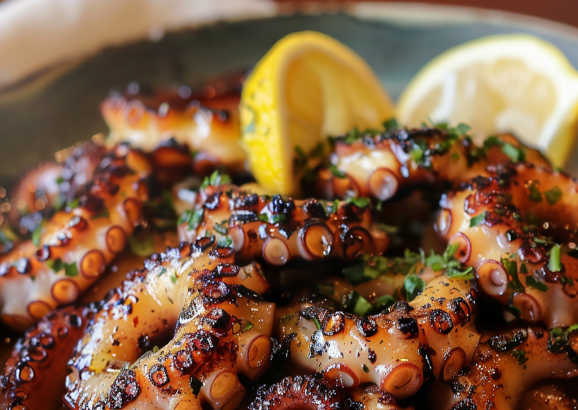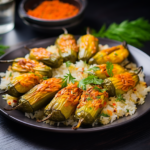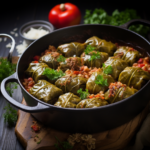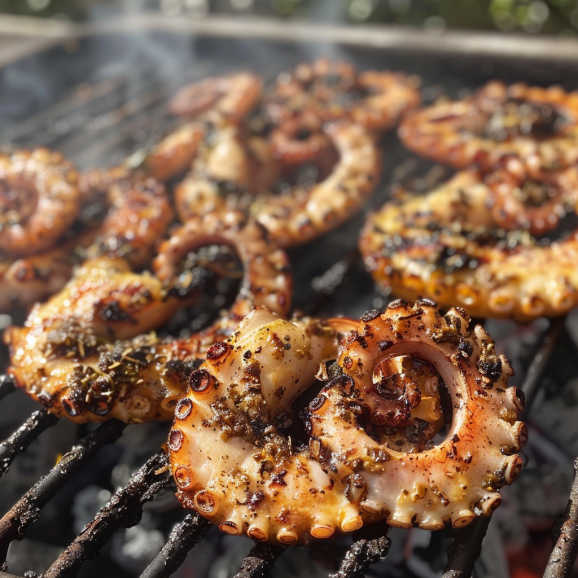
Grilled Octopus: A Delightful Dish in Mediterranean Cuisine
Grilled octopus is a delectable dish that holds cultural significance in Mediterranean and Greek cuisine. Known for its tender and flavorful meat, grilled octopus is a delightful addition to any seafood lover’s menu. In this article, we will explore the art of grilling octopus, from selecting the right ingredients to mastering the cooking techniques. Get ready to tantalize your taste buds with this Mediterranean delicacy.
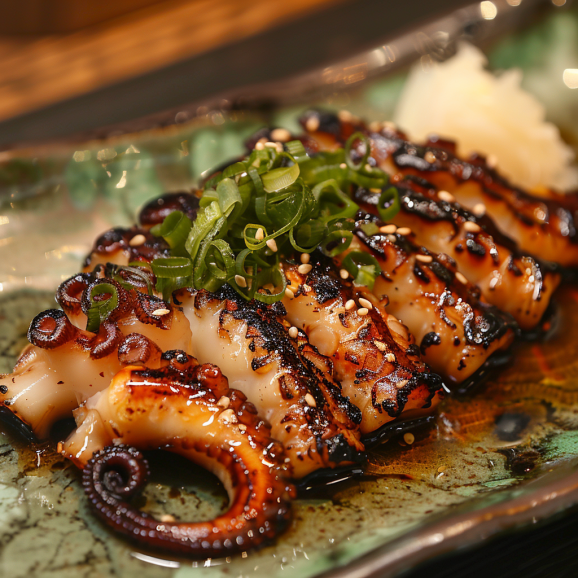
Selecting and Preparing Octopus for Grilling
When it comes to grilling octopus, it is important to start with the right ingredients.Fresh or frozen raw octopus tentacles are recommended for grilling octopus. Look for octopus that is firm and has a vibrant color, indicating its freshness. It is also crucial to ensure that the octopus is sourced sustainably, supporting responsible fishing practices.
Before grilling, tenderizing the octopus is essential to achieve a tender and succulent texture.One common method to tenderize octopus is by boiling or simmering it until it becomes tender. This process helps break down the tough muscle collagen, resulting in a more enjoyable eating experience. By using a combination of water, aromatics, and simmering, you can transform the octopus into a delectable treat.
Removing the skin from the octopus is another step that can elevate the grilling process. While it is not necessary, removing the skin allows for a better sear and enhances the flavor of the octopus. The skin can be easily peeled off after the octopus has been cooked and cooled. This step not only improves the visual appeal of the dish but also allows the marinade and seasonings to penetrate the meat more effectively.
For example, at the renowned Greek restaurant “Olympus Taverna,” the chefs hand-select the freshest octopus and meticulously tenderize it through a combination of boiling and simmering. They remove the skin to achieve a beautiful char and enhance the flavors of their grilled octopus dish.
Enhancing the Flavor: Marinade Options for Grilled Octopus
To infuse the grilled octopus with delightful flavors, a marinade is essential. A classic marinade for grilled octopus consists of olive oil, lemon juice, salt, pepper, oregano, parsley, and garlic. This combination of ingredients provides a Mediterranean flair and enhances the natural taste of the octopus. The acidity of the lemon juice helps to tenderize the meat further and adds a refreshing tang.
At the popular seafood restaurant “Poseidon’s Catch,” they take their grilled octopus to the next level with a unique marinade. In addition to the traditional ingredients, they incorporate a touch of honey and a sprinkle of smoked paprika into their marinade. This adds a hint of sweetness and smokiness, elevating the flavor profile of the dish.
Feel free to customize the marinade by adding different herbs or ingredients according to your personal preference. Experiment with additional spices, such as paprika or chili flakes, to add a kick of heat. The marinade not only enhances the flavor of the octopus but also helps tenderize it further. Allow the octopus to marinate for at least 30 minutes or overnight for optimal flavor infusion.
Pre-cooking and Cooling: Ensuring Tender and Flavorful Octopus
Before grilling, pre-cooking the octopus is crucial to ensure tenderness and flavor development. There are several methods you can use, such as sous vide, simmering, boiling, or even a pressure cooker. Each method has its advantages, so choose the one that best suits your cooking style and equipment.
During the pre-cooking process, it is important to infuse the octopus with aromatics and seasonings. This can be done by simmering the octopus in a flavorful broth containing ingredients like bay leaves, peppercorns, and citrus slices. These aromatics not only enhance the taste of the octopus but also complement the marinade used in the grilling process.
Once the octopus is fully cooked, it is essential to cool it properly. Cooling the octopus in its cooking liquid helps set the skin and retain moisture. This step ensures that the octopus remains juicy and tender during the grilling process. After cooling, the octopus can be refrigerated for a few hours or overnight, allowing the flavors to further develop.
For instance, at the famous seafood grill “Santorini Sea Breeze,” the chefs pre-cook the octopus sous vide style, infusing it with a blend of aromatic spices and a splash of white wine. Once cooked, they allow the octopus to cool in the flavorful liquid, ensuring optimal tenderness and retaining the delicate flavors.
Drying and Preparing for Grilling: Browning and Crisping the Octopus
Before grilling, it is important to dry the octopus thoroughly. This step helps enhance browning and crisping during the grilling process. Excess moisture on the surface of the octopus can interfere with the development of a beautiful char and crispy texture.
To dry the octopus, gently pat it dry with paper towels, removing any excess moisture. Once dried, refrigerate the octopus for a couple of hours. This step allows the surface of the octopus to dry out further, resulting in better browning and more pronounced flavors.
Just before grilling, brush the octopus with olive oil to promote a beautiful char and impart a subtle richness to the flavors. The oil helps to prevent sticking and adds a lusciousness to the finished dish. Season the octopus with salt and pepper to enhance its natural flavors.
At the renowned Mediterranean grill “Aegean Flavors,” the chefs take extra care in drying the octopus before grilling. They use a combination of air-drying and refrigeration to ensure the octopus is perfectly prepared for the grill. This attention to detail results in a mouthwatering dish with a crispy exterior and tender interior.
Grilling Techniques and Cooking Times: Achieving Tender and Flavorful Octopus
Grilling octopus requires a careful balance of time and technique to achieve the desired tenderness and flavor. It is recommended to grill the octopus over direct high heat to sear and crisp the exterior without drying out the interior. High heat allows for the development of a beautiful char, which adds complexity to the flavor profile.
The grilling time may vary depending on the heat of the grill and the distance between the octopus and the grill grate. It is important to monitor the grilling process closely to avoid overcooking or undercooking. Grilling too long can result in a rubbery texture, while undercooking may leave the octopus tough and chewy.
To ensure an optimal grilling experience, it is essential to adjust the cooking time based on the size and thickness of the octopus tentacles. Thicker tentacles may require slightly longer cooking times to achieve the desired tenderness. A good rule of thumb is to grill the octopus for approximately 3-4 minutes per side, or until it develops a charred and crispy exterior.
For example, at the popular seaside grill “Mediterranean Breeze,” the chefs meticulously adjust the grilling time based on the size of the octopus tentacles. They carefully monitor the heat and distance from the grill grate to achieve a perfectly grilled octopus every time.
Serving Suggestions and Accompanying Sauces or Sides
Grilled octopus pairs wonderfully with refreshing accompaniments that complement its delicate flavors. Serve it with lemon wedges and a side of leafy greens for a vibrant and citrusy taste. The acidity of the lemon adds a tangy kick that balances the richness of the grilled octopus.
To elevate the flavors even further, consider accompanying the dish with a chile-herb oil sauce or a lemon and herb mixture. The chile-herb oil sauce adds a subtle heat and herbaceousness, while the lemon and herb mixture brings out the natural flavors of the octopus. These sauces provide a delightful contrast and enhance the overall dining experience.
For those looking to add their own twist to the dish, customization is key. Consider incorporating different herbs or additions into the dressing, such as thinly sliced celery or a sprinkle of fresh dill, to create a unique flavor profile. The versatility of grilled octopus allows for endless possibilities when it comes to pairing it with sauces and sides.
For instance, at the esteemed Greek restaurant “Olympus Taverna,” they serve their grilled octopus with a zesty yogurt sauce made from Greek yogurt, cucumber, garlic, and dill. This sauce adds a refreshing and creamy element that complements the smoky flavors of the grilled octopus.
Pro Tips for Grilling Octopus Successfully
To ensure a successful grilling experience with octopus, here are some pro tips to keep in mind:
- Tuck the tips of the tentacles while grilling to prevent burning. This simple technique helps to evenly cook the octopus and prevents any charred or overcooked areas.
- Use high-quality olive oil for the dressing, as it won’t be cooked and its flavor will shine through. The choice of olive oil can greatly impact the overall taste of the dish, so opt for a premium quality oil with a robust flavor.
- Monitor the grilling time closely and adjust as needed to achieve the desired texture. Remember that the size and thickness of the octopus tentacles may affect the cooking time, so always check for doneness.
- Experiment with different grilling techniques and flavor combinations to find your personal favorite. Grilling octopus is a culinary adventure that allows you to explore various methods and ingredients to create a dish that suits your taste.
By following these pro tips, you will be well on your way to grilling octopus like a seasoned chef.
Easy Grilled Octopus Recipe
If you’re ready to embark on your own grilled octopus journey, here is a simple recipe to guide you:
Ingredients:
- 2 pounds of fresh octopus
- Olive oil
- Garlic
- Lemon juice
- Salt
- Pepper
- Dried oregano
- Fresh parsley
- Start by boiling the octopus in a pot of salted water for 40-45 minutes, or until tender. This cooking method helps to infuse the octopus with flavor while ensuring a tender texture.
- Once cooked, allow the octopus to rest and cool in its cooking liquid. This step helps to set the skin and retain moisture, resulting in a more succulent grilled octopus.
- After the octopus has cooled, pat it dry with paper towels to remove any excess moisture. Place the octopus in the refrigerator for a couple of hours to allow the surface to dry further.
- Preheat your grill to high heat. Brush the octopus with olive oil and season it with salt, pepper, dried oregano, and minced garlic. These seasonings will enhance the natural flavors of the octopus and add a Mediterranean touch.
- Place the octopus on the grill and cook for 3-4 minutes per side, or until it develops a charred and crispy exterior. Remember to adjust the grilling time based on the size and thickness of the tentacles.
- Once grilled to perfection, remove the octopus from the grill and drizzle it with a mixture of olive oil, lemon juice, minced garlic, and chopped fresh parsley. This dressing will add a burst of freshness and enhance the flavors of the grilled octopus.
- Serve the grilled octopus with lemon wedges and a side of your choice, such as a crisp salad or roasted vegetables. The bright citrus notes and smoky flavors of the octopus create a harmonious combination that is sure to delight your taste buds.
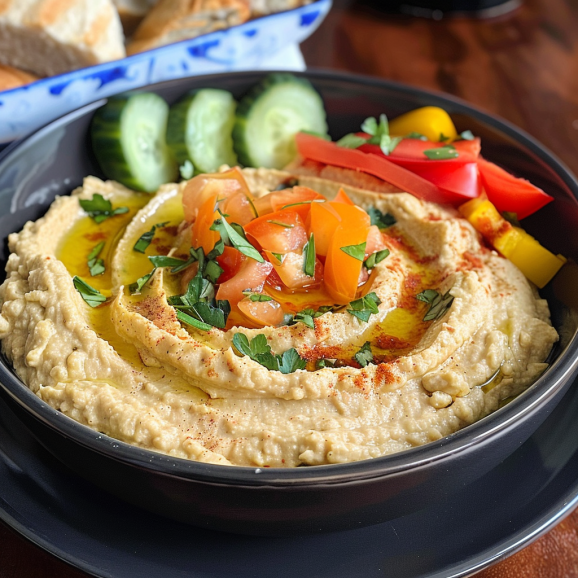
Exploring Greek Cuisine: Unveiling the Delights of Grilled Octopus
Grilled octopus holds cultural significance in Greek cuisine, reflecting the warmth and richness of Greek culinary traditions. For centuries, Greeks have perfected the art of grilling octopus, turning it into a beloved dish commonly found at traditional tavernas and seaside restaurants.
To truly immerse yourself in the delights of grilled octopus and Greek cuisine as a whole, consider exploring Chef on a Bike’s website at https://chefonabike.com/. This online resource is a treasure trove of information, recipes, and culinary inspiration that celebrates the vibrant flavors and heritage of Greek food.
Discover traditional Greek dishes, breakfast and brunch options, grilled meat recipes, and more. Learn about the history and techniques behind Greek cuisine, as well as the cultural significance of various ingredients and cooking methods. Whether you’re a seasoned cook or a culinary enthusiast, Chef on a Bike offers a wealth of knowledge to help you recreate authentic Greek flavors in your own kitchen.
Impress your guests with the vibrant flavors of Greek cuisine and the delightful taste of grilled octopus. Whether you’re hosting a summer gathering or simply craving a taste of the Mediterranean, grilled octopus is sure to please. Its tender meat, smoky flavor, and ability to absorb a myriad of flavors make it a standout dish that will transport you to the sun-kissed shores of Greece.

Greek Grilling
Secrets of Greek Grilling Techniques Discover the art of Greek grilling techniques, including how to prepare delicious souvlaki and other grilled specialties.
Greek Grilled Lamb Chops with Lemon Indulge in the juicy and tender chunks of beef souvlaki, marinated in traditional Greek flavors and grilled to perfection.
Greek Easter Lamb on a Spit Learn the traditional Greek method of cooking lamb on a spit for Easter celebrations, a culinary tradition passed down through generations.
Dive into the Juicy and Tender Chunks of Beef Souvlaki Delight in the savory flavors of beef souvlaki skewers, a Greek specialty grilled to perfection and served with creamy tzatziki sauce.
Delicious Souvlaki Skewers with Creamy Tzatziki Sauce Explore the authentic taste of Greece with these succulent souvlaki skewers, served with a refreshing homemade tzatziki sauce.
Celebrity Chefs on Chef on a Bike YouTube
Greek TV Chef Anna-Maria Barouh
- Facebook: Anna-Maria Barouh
- Instagram: annamariabarouh
- Celebrity Chef, Food Stylist, Recipe Developer Anna Maria Barouh is our guest on Chef on a Bike. Anna-Maria is a regular on Greek Television and has a very popular food blog and is a magazine contributor.
- YouTube Episode: Chef on a Bike YouTube Episode
Cyprus’ Culinary Ambassador – Marilena Joannides
- Cyprus’ Culinary Ambassador – Marilena Joannides shows us how to make Easter Bread typical of Karpasia Cyprus. Marilena Joannides is a Culinary Expert known for her extensive research and knowledge in Mediterranean Cuisine. She is also the author of Cyprus Food Treasures. YouTube Episode: Chef on a Bike Episode
Grill Philosophy Greek Recipes and Grilling
- YouTube Channel: Grill Philosophy Explore traditional Greek recipes and grilling techniques with Grill Philosophy on Chef on a Bike.






